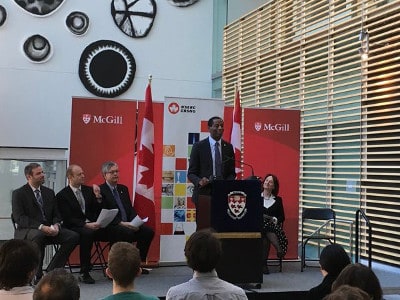
 Representatives of the Natural Sciences and Engineering Research Council of Canada (NSERC) was at McGill University in Montreal yesterday to announce a $21.4 million investment to help fund innovative projects and prepare science and engineering graduates for the labour market through its Collaborative Research and Training Experience (CREATE) initiative.
Representatives of the Natural Sciences and Engineering Research Council of Canada (NSERC) was at McGill University in Montreal yesterday to announce a $21.4 million investment to help fund innovative projects and prepare science and engineering graduates for the labour market through its Collaborative Research and Training Experience (CREATE) initiative.
The funding will be distributed to 13 recipients across Canada, who meet CREATE’s criteria of training students and encouraging collaborative approaches to addressing key scientific challenges associated with Canada’s research priorities.
CREATE’s four current priority areas are environmental science and technologies, manufacturing, information and communications technologies, and natural resources and energy, which are reflected in the activities of the fund’s recipients, which cover research areas as diverse as electric cars, aerospace and planetary sciences, optics, geoscience and mining, computer gaming, medical technology, zoo/aquarium biodiversity conservation and marine ecosystem preservation.
“Today’s announcement is wonderful news for the 13 recipient research teams across the country, and also for the future of academic and industry educational partnerships in Canada,” said McGill University Vice-Principal of Research and International Relations Dr. Rosie Goldstein. “Dr. Jake Barralet’s newly funded project at McGill, Innovation at the Cutting Edge, will be a model program of industry partnership in the area of surgical devices. The project’s participants will benefit from unparalleled preparation for career opportunities in healthcare technology.”
McGill University professor and scientist at the Research Institute of the McGill University Health Centre Jake Barralet, whose six-year surgery-related training technology project will receive $1.65 million from the fund, was on hand to talk about the benefits of the funding.
“This award provides a unique opportunity for teams of surgeons, scientists, engineers, and business students to work together to improve patient care by applying the process of needs-based clinical innovation,” said Barralet, who is also Vice Chair for Research at McGill’s Department of Surgery in the Faculty of Medicine. “The McGill University Health Centre provides a fertile environment to expose this multi-disciplinary team to a variety of clinical problems, challenging them to create innovative solutions.”
Barralet’s McGill project has 15 private-sector industry partners, one of which is Kinova Robotics, and will provide approximately 90 McGill undergraduate and graduate students who specialize in the field of surgical robotics access to cross-disciplinary training.
NSERC’s priorities, set out in a vision for the organization’s future to the year 2020 in president B. Mario Pinto’s Strategic Plan, are to facilitate the transition of small-to-medium enterprises to growth enterprises by helping them to leverage the intellectual capital, discovery research and fundamental research coming out of Canadian universities.
“Small and medium-sized enterprises (SMEs) in Canada face enormous challenges making the transition into growth companies,” writes Pinto. “For SMEs, access to intellectual capital to inform and refine R&D can be a significant rate-enhancing factor in their growth. We are focused on building industry-researcher partnerships to help these companies grow. These partnerships validate and de-risk opportunities stemming from discovery research for future investment or further development via business-led R&D.
Leave a Reply
You must be logged in to post a comment.





 Share
Share Tweet
Tweet Share
Share




Comment